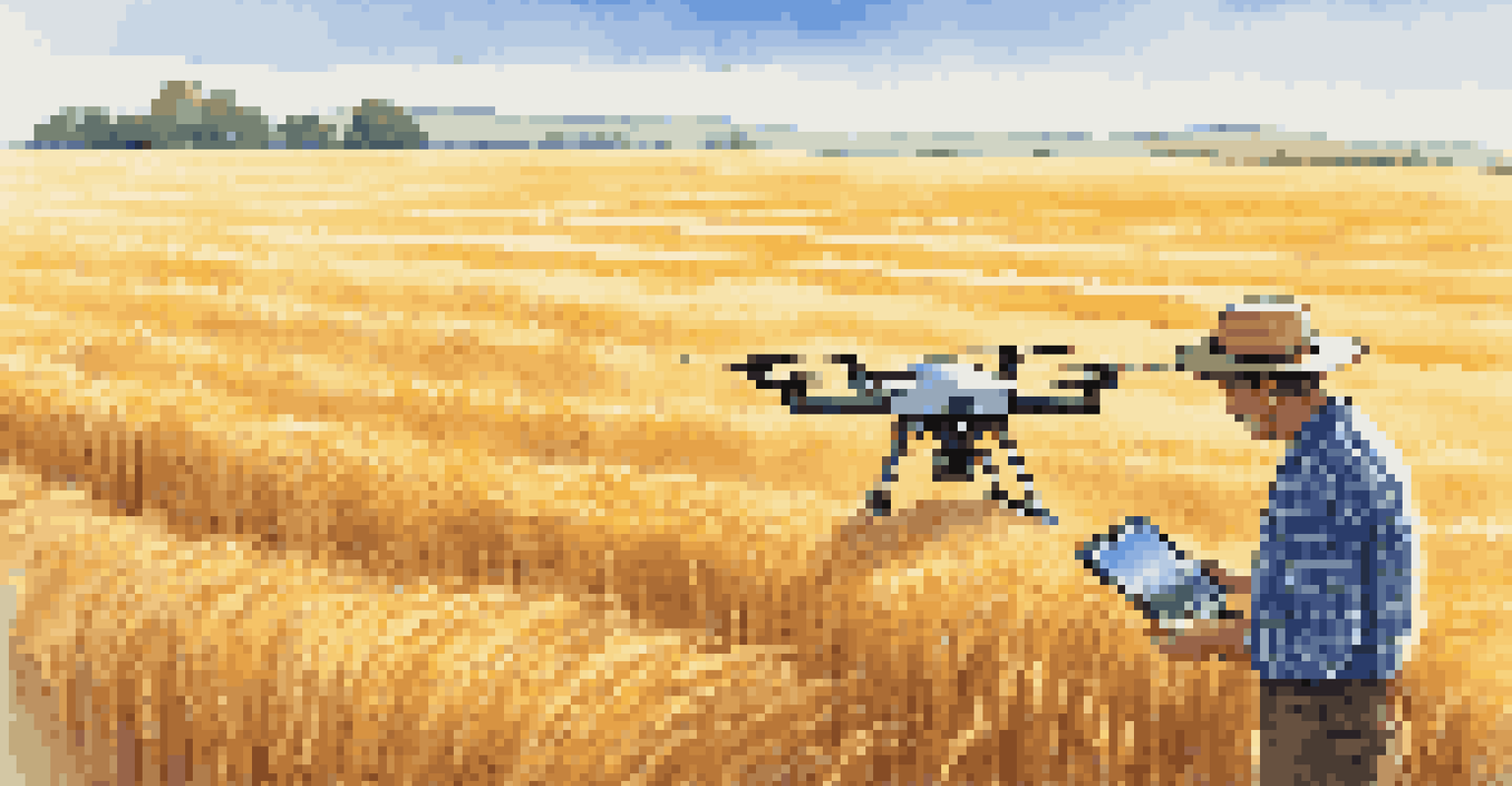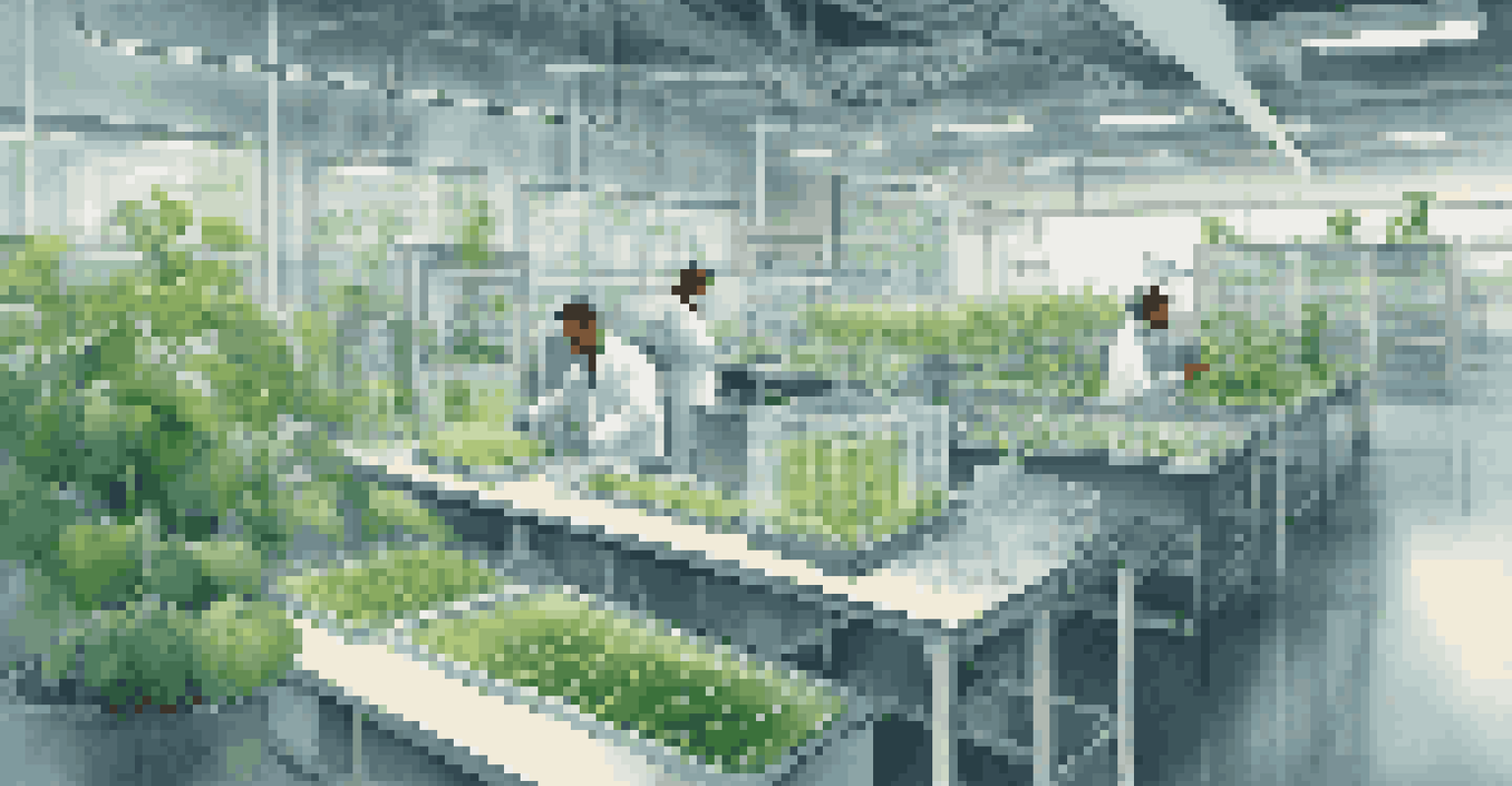Investing in Agricultural Technology: A New Frontier

Understanding the Role of Agricultural Technology Today
Agricultural technology, often referred to as AgTech, encompasses a wide range of innovations designed to enhance farming efficiency and productivity. From precision farming tools to data analytics, these technologies are revolutionizing how food is produced. As the global population continues to grow, the demand for sustainable agricultural practices is more pressing than ever.
Agricultural technology is not just about feeding the world, but also about sustaining it for future generations.
Investing in AgTech is not just about improving crop yields; it’s also about sustainability. Many technologies focus on reducing waste, conserving water, and minimizing the environmental impact of farming. This shift toward environmentally friendly practices is becoming a significant selling point for investors looking to make a positive impact.
Moreover, the integration of technology in agriculture can help farmers manage their resources more effectively. For instance, using drones for crop surveillance can provide insights into plant health and soil conditions, allowing farmers to make informed decisions. This level of precision can lead to better yields and reduced costs, making AgTech a compelling investment opportunity.
Current Trends Shaping Agricultural Technology Investment
One of the most significant trends in AgTech is the rise of vertical farming. This innovative approach allows for the cultivation of crops in stacked layers, often in urban settings, which maximizes space and minimizes transportation costs. As cities continue to grow, the demand for locally sourced produce is driving interest in this investment avenue.

Another trend is the increasing use of artificial intelligence (AI) and machine learning in agriculture. These technologies can analyze vast amounts of data to predict crop performance and optimize planting strategies. By investing in companies utilizing AI, investors can tap into the future of farming, where data-driven decisions lead to improved outcomes.
AgTech Boosts Farming Efficiency
Agricultural technology enhances farming efficiency and sustainability, responding to the growing demand for food production.
Additionally, biotechnology is making waves in the AgTech sector. Advances in genetic engineering and CRISPR technology are enabling the development of crops that are more resistant to pests and diseases. As consumers become more health-conscious, the demand for genetically modified organisms (GMOs) that offer nutritional benefits is likely to rise, making this a hot area for investment.
The Benefits of Investing in Agricultural Technology
Investing in AgTech comes with several advantages, one of which is the potential for high returns. As the global demand for food increases, technologies that improve efficiency and sustainability are likely to see significant growth. Investors who get in early can capitalize on this trend and potentially reap substantial rewards.
The future of farming is not just about the land, but about the technology that enhances it.
Another benefit is the opportunity to contribute to global food security. By supporting innovations that enhance agricultural productivity, investors can play a role in ensuring that populations have access to sufficient food. This sense of purpose can be particularly appealing to socially conscious investors.
Moreover, AgTech investments often attract government support and funding. Many countries are recognizing the importance of sustainable agriculture and are providing grants and incentives for technology adoption. This backing can enhance the stability and growth potential of AgTech companies, making them more attractive to investors.
Challenges Facing Agricultural Technology Investments
Despite the promising landscape, investing in AgTech is not without its challenges. One significant hurdle is the regulatory environment, which can vary widely between countries. Navigating these regulations can be complex and may deter some investors.
Additionally, the agricultural sector is often conservative and slow to adopt new technologies. Farmers may be hesitant to shift from traditional practices to high-tech solutions, which can slow down the growth of innovative companies. This reluctance can present a risk for investors looking for rapid returns.
Investing in Sustainable Practices
Investments in AgTech not only promise high returns but also contribute to global food security and environmental sustainability.
Furthermore, the capital-intensive nature of AgTech can be a barrier to entry. Developing advanced technologies often requires substantial upfront investment, which can be a deterrent for startups. Investors need to carefully assess the financial viability of these ventures before committing funds.
Identifying Key Players in the Agricultural Technology Sector
When considering AgTech investments, it's essential to identify key players in the sector. These include startups innovating in areas like precision agriculture, biotechnology, and farm management software. Being aware of emerging companies can provide investors with unique opportunities to get involved at an early stage.
Established companies are also making strides in AgTech. Many traditional agricultural firms are investing in technology to enhance their operations and product offerings. By partnering with or investing in these companies, investors can leverage their existing market presence while supporting technological advancements.
Moreover, venture capital firms specializing in AgTech are becoming increasingly important. These firms not only provide funding but also bring expertise and networks that can help startups scale. Investors should consider collaborating with or investing in these venture capital firms to gain insights and reduce risks.
The Future of Agricultural Technology Investments
Looking ahead, the future of AgTech investments appears bright. As technology continues to advance, new opportunities will arise in areas like sustainable farming practices, climate-smart agriculture, and digital platforms that connect farmers with consumers. Staying informed about these trends will be crucial for investors.
Moreover, the increased focus on food sustainability and security will likely drive further investment into AgTech. As consumers demand more transparency and accountability from food producers, technologies that can provide traceability and quality assurance will be in high demand. This shift presents a ripe opportunity for investment.
Navigating AgTech Investment Challenges
Investors must be aware of challenges such as regulatory hurdles and the conservative nature of the agricultural sector when considering AgTech opportunities.
Finally, as global challenges such as climate change and resource scarcity become more pressing, the need for innovative solutions in agriculture will only grow. Investors who position themselves strategically within the AgTech space can not only achieve financial success but also contribute to positive environmental and social outcomes.
Conclusion: Embracing the AgTech Investment Opportunity
In conclusion, investing in agricultural technology represents a new frontier with immense potential. From enhancing food security to promoting sustainable practices, AgTech offers both financial returns and the chance to make a positive impact on the world. As the sector evolves, investors have the opportunity to shape the future of agriculture.
By understanding the trends, benefits, and challenges of AgTech investments, individuals and institutions can make informed decisions. Whether it's through startups, established companies, or venture capital firms, there are numerous pathways to engage with this dynamic sector.

As we look to the future, embracing the AgTech investment opportunity not only makes sense economically but also aligns with the growing demand for responsible and sustainable practices in agriculture. Now is the time to explore the possibilities that lie ahead in this exciting field.